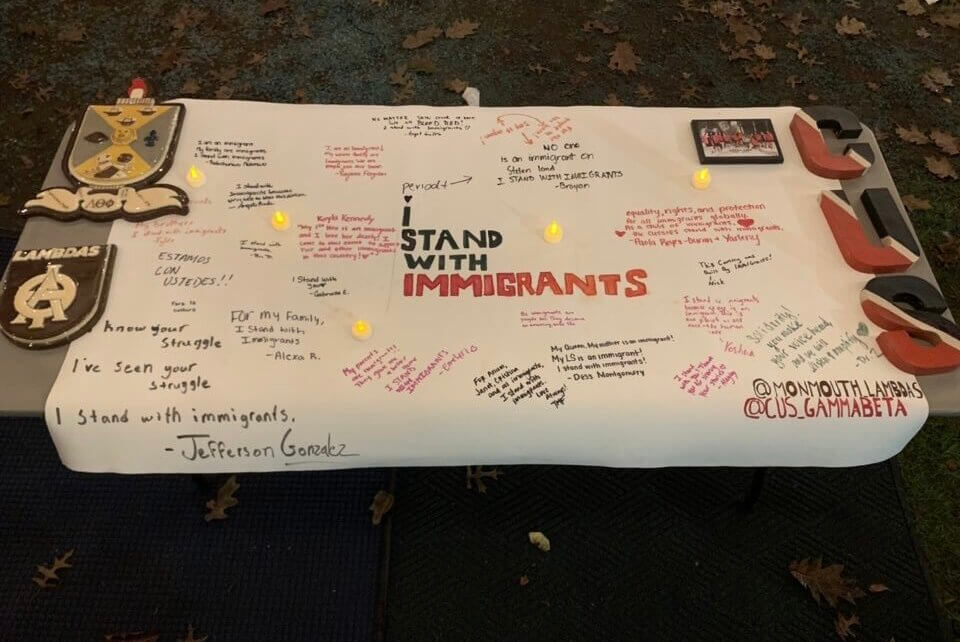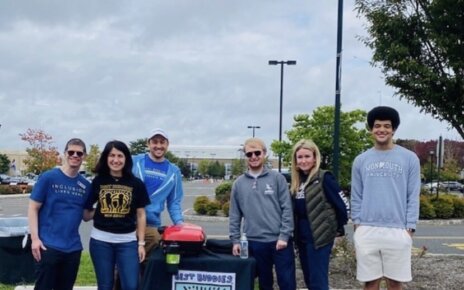On Oct. 13 the sisters and brothers of Chi Upsilon Sigma National Latin Sorority Inc. and Lambda Theta Phi Latin Fraternity Inc. co-hosted “I Stand With Immigrants.” The event, which took place on Shadow Lawn, gave immigrant students a platform to share their stories, and the challenges surrounding moving to a new country. It served as a moving call to action for members of the campus community and beyond to fight for the advancement and support of immigrants, regardless of documentation status.
The speakers of the event, Angelo Prado of Brazil, Rayanna Ferguson of Jamaica, Raluchukwu Molokwu of Nigeria, and Lisette Peña of the Dominican Republic are all students at Monmouth University who proudly represent the 500 million first and second-generation immigrant students enrolled at higher education institutions in the United States. Though their backgrounds are all diverse, their stories have many commonalities that highlight what life is like as a young immigrant establishing themselves in America.
Brayan Loja, a brother of Lambda Theta Phi Latin Fraternity Inc., served as the event’s moderator, asking the speakers to share vulnerable tales of their immigration experience. He began the event by inviting the speakers to share what they remember about growing up in their home countries.
While Prado, a native of Brazil, reflected on his younger years spent as a student learning English as a second language, Ferguson reminisced about Jamaican cuisine. She said, “I miss the food so much. A tradition in Jamaica is eating as a family always. We’re very family-oriented, so I miss…everything.” Similarly, Peña recalled spending time with her cousins; playing games like marbles and hopscotch outside since they often lost power in her native Dominican Republic.
Next, Loja called on his peers to share what immigrating was like: who they came with, and who they left behind. Prado left Brazil with his parents and sister and left behind his cousins and friends. Molokwu also left Nigeria with her immediate family and was faced with parting with her extended family members. Pena shared that she left the Dominican Republic alongside her mother and sister, while her father arrived in the States several years later.
For Ferguson, her experience coming to America was quite different. She shared that at the age of ten, she came to the United States by herself. She recalled, “My mom was already here, and so was my biological father. He lived previously in New York. So when I came here, I first lived a year in Poughkeepsie, New York. It was really cold, it was in the mountains, and then I moved to New Jersey.”
Loja invited the speakers to share some of the hardships of coming to the United States when he asked them to explain what the most difficult part of leaving their home country was. Prado explained that he struggled with leaving his best friends and family. Molokwu felt the same. She said that her mom didn’t tell her they were leaving until the day before they came to the United States. “I didn’t really know the distance either because I was so young. I was like, ‘Oh, okay, we’re gonna come back,’ and we never did.”
Ferguson also shared the challenges of such a large change at such a young age. “For me, it was tough because I was so young. I couldn’t comprehend why I was coming here, and I also couldn’t understand why my whole family couldn’t come with me.”
Peña recalled missing her father and grandmother but explained that she was also excited to be in the United States with her mother and sister. “As long as it was just my mom, my sister, and I, it wasn’t really a big shock to me. From what I remember, I was just assuming my mom was doing what was best for us at the time.
As for their reactions when arriving in the United States, Prado, Ferguson, Molokwu, and Peña all described being shocked by the cold weather. Molokwu recollected her arrival, which took place during one of the worst winters in history. Her immediate reaction was, “Why is it so cold here?”
Beyond just the colder climate of the Northeast, an element of culture shock also occurred upon their arrival. Ferguson explained that while everyone in Jamaica is very social and outgoing, people in the United States tend to keep to themselves. In addition, Peña was shocked by the readily available supply of water, as this was not the case in the Dominican Republic.
Prado, Molokwu, and Peña all shared the hardships associated with learning a new language. Molokwu struggled with people making fun of her accent, and while Peña already knew English, to this day she has to remain an advocate and translate for her parents who both do not speak English. She said, “That’s a lot of pressure on a teenager.”
Despite the challenges associated with immigrating to the United States, all four students have been motivated to become better and rise above everyday obstacles. Ferguson said, “It definitely motivated me to succeed. I am an older sister and sometimes I would tell my little brother to imagine the feelings that I felt growing up. I just want to let him know, and show him that no matter where you come from, no matter what language you speak, you can make it here.”
This event was moving and inspiring, and Prado, Ferguson, Molokwu, and Peña serve as exemplary members of the campus community for their bravery, strength, and commitment to empowering and amplifying the stories of immigrants.
For more information on the sisters and brothers of Chi Upsilon Sigma and Lambda Theta Phi, the event’s sponsors, check them out on Instagram, @cus_gammabeta and @monmouth_lambdas.



